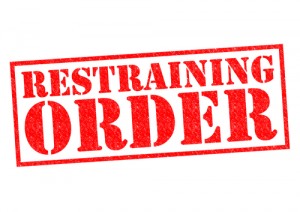What You Should Know About Restraining Orders
Posted January 5th, 2016 by Anthony Carbone, PC.
Categories: Domestic Violence.
 There are many misconceptions of when a judge will order a restraining order forbidding contact between parties. Some feel mistakenly feel that restraining orders will be granted for disputes between neighbors or friends. Others attempt to obtain restraining orders for minor disagreements. Learn here what you should know about restraining orders.
There are many misconceptions of when a judge will order a restraining order forbidding contact between parties. Some feel mistakenly feel that restraining orders will be granted for disputes between neighbors or friends. Others attempt to obtain restraining orders for minor disagreements. Learn here what you should know about restraining orders.
What is a Restraining Order?
First, it should be clear that there are different types of restraining orders. The most common restraining order is granted to people that seeking relief under the Prevention of Domestic Violence Act (PDVA). A restraining order is a formal document signed by a judge designed to protect individuals from domestic violence.
What is Domestic Violence?
There are many criminal offenses that fall under the category of domestic violence. These include the following crimes committed against those considered eligible to seek a restraining order:
- Homicide
- Assault
- Terroristic Threats
- Kidnapping
- Criminal Restraint
- False Imprisonment
- Sexual Assault
- Sexual Contact
- Lewdness
- Criminal Mischief
- Burglary
- Criminal Trespass
- Harassment
- Stalking
Who is Eligible for a Restraining Order?
In order for someone to apply for a restraining order under the PDVA, the parties are required to have a preexisting relationship. This includes:
- Married couples or those previously wed to each other
- Couples who share a parental relationship (this includes those who are expecting the birth a child)
- Individuals who are dating or have dated in the past (provided the assailant is over eighteen or considered an emancipated minor)
- Present or former household members who are over eighteen or emancipated minors
You can read more about domestic violence and minors here. There is a distinction between acts that seemingly appear to be domestic violence, but involve minors who have not been emancipated.
Other Types of Restraining Orders
We have noted that there are certain relationship requirements to obtain a restraining order under domestic violence laws. But, what if a person is sexually assaulted by a stranger? What if the sexual attacker is someone the victim knows, but never dated or married? Nicole’s Law allows the victim to seek protection against her assailant. A judge may grant a restraining order to prevent the accused from coming in contact with the victim. There is no requirement for conviction for the issuance of a restraining order under Nicole’s Law. The restraining order is often ordered as a condition for bail.
Those accused of certain drug offenses may be issued a restraining order under the Drug Offender Restraining Order Act (DORA). This type of restraining order may ban a defendant from specified locations.
Contact Us
Restraining orders are serious matters. If you feel you need a restraining order, the Law Offices of Anthony Carbone can offer you assistance. Similarly, if someone is seeking a restraining order against you, we suggest legal counsel. Contact us to see how we can help you.


